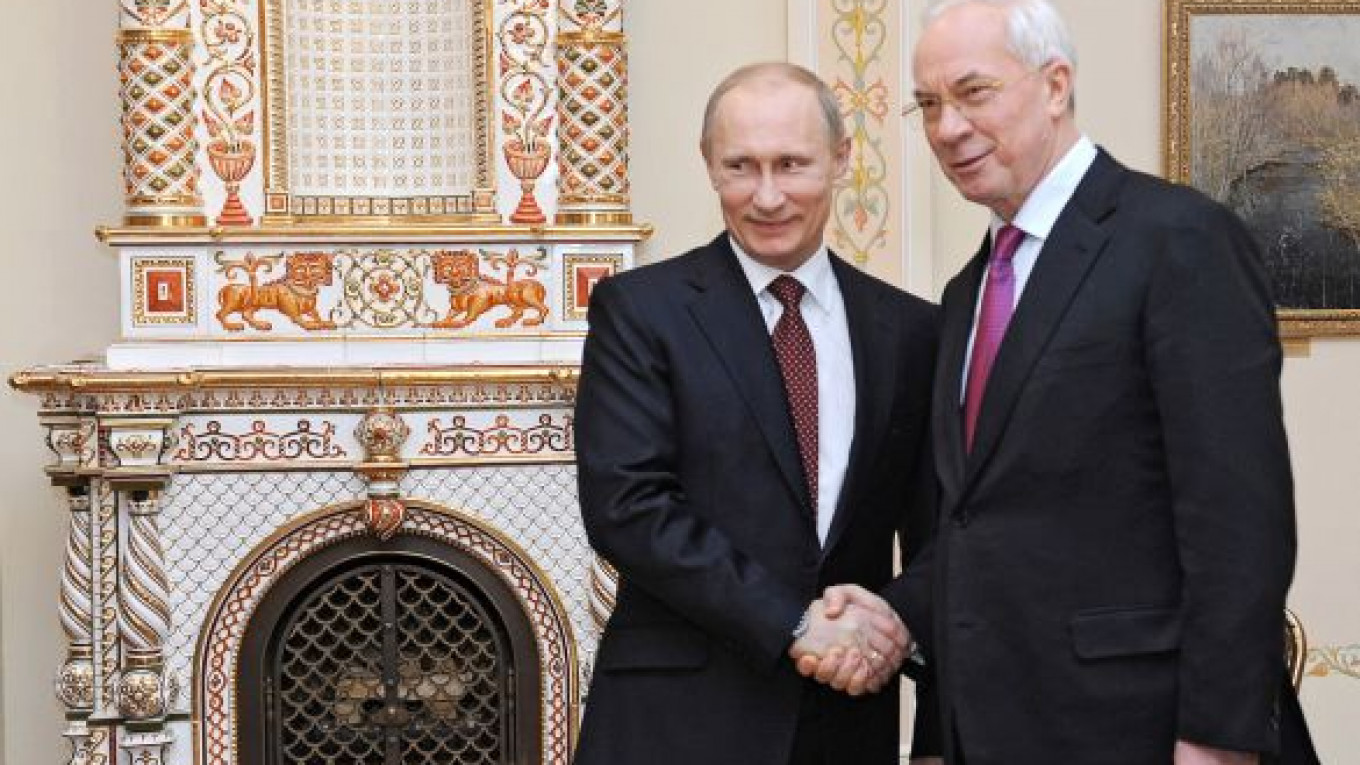Prime Minister Vladimir Putin and Ukrainian counterpart Mykola Azarov failed to achieve a breakthrough in talks over Kiev's push for a gas price cut to help its struggling economy and soothe European supply concerns.
Both countries have sworn that failure to reach a deal would not affect transit flows of Russian gas to Europe, which have twice been cut in the past decade when Moscow and Kiev haggled over the terms of gas deliveries to Ukraine.
"We need to seek a compromise, a mutually beneficial decision," Azarov said after the talks late Tuesday night at Putin's Novo-Ogaryovo residence outside Moscow. "I hope that today's talks will give a decisive impulse in the search for a final resolution."
The late-night press event was a brief, low-key affair. Putin said it was important to "propose a path for development" of the sector.
On Wednesday morning, Azarov told a government meeting that Ukraine's energy and justice ministers were continuing negotiations in Moscow and had been tasked with finalizing a new deal.
"A number of issues are being discussed, including the volume of transit, the price and establishing a gas shipping consortium," he said.
Government and industry sources had played down the prospects for a deal, which means that Europe's energy industry, which briefly lost some or all of its Russian supplies in 2006 and 2009, may be on edge until the New Year and beyond.
There is no clear deadline for a deal, which is seen as important to securing shipments of gas to Europe by establishing a compromise price and joint control of the transit pipelines that carry more than half of Russian gas deliveries to Europe.
Gazprom has little incentive to hurry with a deal while it stands to gain leverage in the talks as Ukraine's fiscal position worsens. It also continues to collect the higher price stipulated in the current contract in the meantime.
"These talks will go on for a very long time," said one Moscow-based industry analyst and long-time Gazprom watcher. "Even when they announce that they've 'agreed,' they'll have to talk for another year."
Azarov, whose government is struggling with a huge trade deficit and has borrowed money from a Russian gas industry bank to pay its November gas bill, told reporters in Prague on Monday that a deal was just days away.
"There was lots of movement a week ago, but now it's all quiet," a source in Russia's Energy Ministry said earlier.
Azarov's government, however, went ahead last week with a 2012 budget that did not include a price cut. On Wednesday, Azarov said the budget could be reviewed if a gas deal was reached.
"From pure logic and economics, Ukraine can't sustain this price any more," said a financial source who does business with both governments. "So in my opinion some kind of arrangement must be reached, otherwise Ukraine will be in real trouble in 2012."
Ukraine pays about $400 per 1,000 cubic meters of Russian gas and the price, linked to global oil and oil product prices, is set to jump to $485 in the first quarter of 2012.
The government subsidizes household gas and heating prices and plans to spend $1.5 billion from the state budget next year on such subsidies.
Ukrainian President Viktor Yanukovych said Friday that his country should pay no more than $250 per 1,000 cubic meters.
Russia has long said it wants a stake in Ukraine's pipeline system in return for a discount while Kiev insists on a three-party consortium that will include a large European energy firm.
Agreeing to Russia's terms is politically risky for Yanukovych as his Party of the Regions prepares for the October 2012 parliamentary elections.
Many in Ukraine would see selling a large stake in the pipeline system to Gazprom as conceding economic sovereignty. The European Union, which wants shipping to be separated from production, is also unlikely to welcome such a move.
A Message from The Moscow Times:
Dear readers,
We are facing unprecedented challenges. Russia's Prosecutor General's Office has designated The Moscow Times as an "undesirable" organization, criminalizing our work and putting our staff at risk of prosecution. This follows our earlier unjust labeling as a "foreign agent."
These actions are direct attempts to silence independent journalism in Russia. The authorities claim our work "discredits the decisions of the Russian leadership." We see things differently: we strive to provide accurate, unbiased reporting on Russia.
We, the journalists of The Moscow Times, refuse to be silenced. But to continue our work, we need your help.
Your support, no matter how small, makes a world of difference. If you can, please support us monthly starting from just $2. It's quick to set up, and every contribution makes a significant impact.
By supporting The Moscow Times, you're defending open, independent journalism in the face of repression. Thank you for standing with us.
Remind me later.






